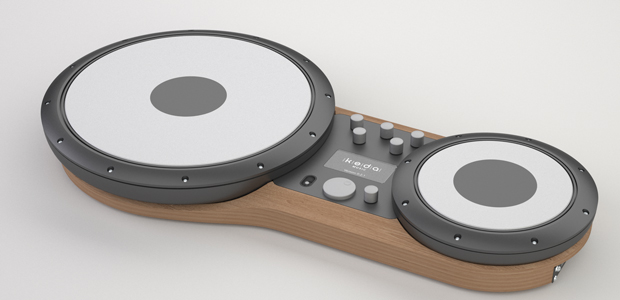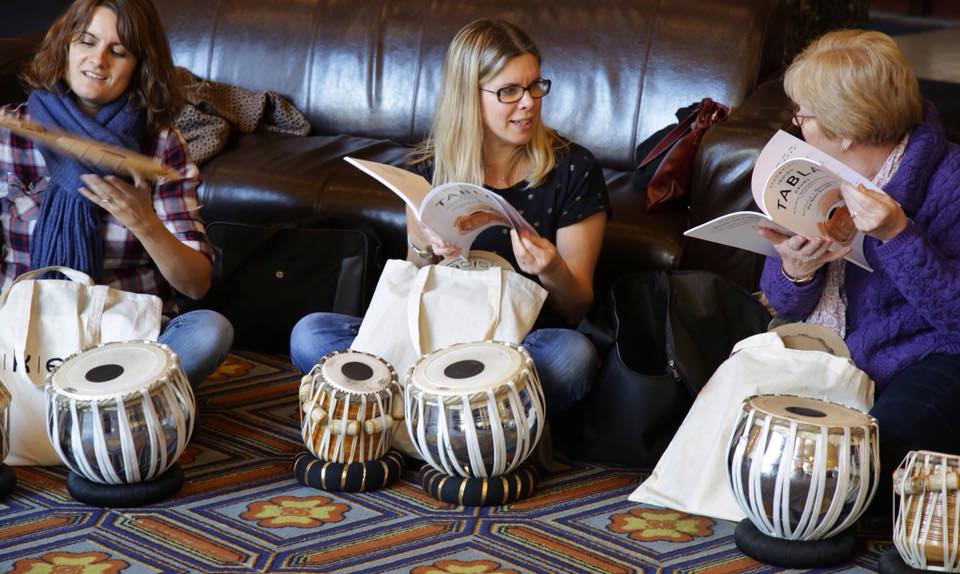
The world's first electronic tabla - The tabla touch
International renowned performer, composer and producer who pioneered the British Bhangra sound, Kuljit Bhamra MBE has launched the world’s first electronic tabla.
Kuljit has performed in the West End in Andrew Lloyd Webber’s ‘Bombay Dreams’ and the motion picture ‘Bend It Like Beckham’, he has been awarded an MBE for he services to music and is one of the leading tabla players in the world. He is an inventor and alumni from the first CRL accelerator programme where his journey to revolutionising the tabla drum started. “It is a proud moment for the Central Research Laboratory to see such a diversely talented professional go from strength to strength” Toby Kress Managing Director, Central Research Laboratory.
Kuljit is on a mission to make Indian drumming available to musicians from all backgrounds and cultures. He is a self-proclaimed demystifier of Indian music and founded his startup company Keda Music five years ago at the Central Research Laboratory on the site of the old EMI gramophone and vinyl factory in Hayes, Middlesex.
Together with a team of designers and electronics experts, he has developed an electronic version of the tabla - an instrument widely accepted as one of the most expressive hand drums.
The tabla is a traditional pitched two-piece Indian drum set, popular not only within South East Asian music, but whose sounds also regularly feature in western music. Yet the tabla remains an aural tradition, taught largely through a guru system heavy in custom and mystique. The tabla also poses problems for schools and professionals in performance environments as they are physically bulky, fragile, and reactive to environmental factors such as damp and heat. Made from animal hide, the drums require careful maintenance and frequent tuning, a highly-skilled process. What sets the tabla apart from other hand drums and bongos throughout the world, is the addition of a circular spot of carbon paste on the drumhead. The paste increases the resonance of the drums, enabling a wide range of tones that gives the tabla its characteristic sound.
The new electronic version, named ‘Tabla Touch’ will allow musicians and composers to access the beautiful and highly nuanced sounds of the tabla without having to worry about maintenance and tuning. It is lighter in weight than the acoustic tabla and can be placed on a table, desk or mounted on a stand. Tuning can be adjusted by turning a dial and the unit can be connected to an amplifier or played through headphones. It can also be connected to a computer to create tabla score, or a MIDI module to access other sounds whilst playing its highly sensitive touch surface. The onboard sound banks include other Indian drums such as dholak, khol and pakhawaj.

Bhamra believes that just as the guitar and piano have electric versions, so too can the tabla. He is certain that this new instrument will provide a gateway to help more people access the instrument - currently an exclusive arena in his opinion.
Kuljit said: “The electronic tabla is part of a wider effort to demystify Indian music. It’s been over fifty years since Sergeant Pepper’s Lonely Hearts Club album was released and despite the immensely popular collaborations between The Beatles and Ravi Shankar, nothing has changed since then - there aren’t more people playing Indian instruments. In addition, the propagated notion that the tabla is notoriously difficult to play (and somehow spiritual in nature) has kept non-Indians away from it. The popularity of touchpads, tablets and phones has forced us to become more dextrous. I’m excited to see how people react to the Tabla Touch and hope that they see it as a perfect combination of a traditional instrument with modern electronics.”
He continued: "We have already successfully launched a western score- friendly tabla notation, a series of instructional books and an educational web-series. We also run workshops around the UK teaching tabla to a wide range of students: from primary school beginners, to percussion students at internationally respected music conservatoires. These workshops have helped us build our understanding of what aspiring tabla players and educators outside the guru-disciple tradition need in order to help them learn and teach tabla. It’s very exciting! We are also currently developing an electronic version of the popular Dhol drum which we hope to launch early next year”.
Kuljit has gain a lot of media attention in light of his launch, with televised interviews on ITV London, BBC Asian Network and BBC Click which will be airing on Boxing Day. This Friday BBC London will be filming him perform next to the iconic Nipper statue at Central Research Laboratory.

